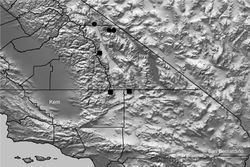Aptostichus derhamgiulianii
| Notice: | This page is derived from the original publication listed below, whose author(s) should always be credited. Further contributors may edit and improve the content of this page and, consequently, need to be credited as well (see page history). Any assessment of factual correctness requires a careful review of the original article as well as of subsequent contributions.
If you are uncertain whether your planned contribution is correct or not, we suggest that you use the associated discussion page instead of editing the page directly. This page should be cited as follows (rationale):
Citation formats to copy and paste
BibTeX: @article{Bond2012ZooKeys252, RIS/ Endnote: TY - JOUR Wikipedia/ Citizendium: <ref name="Bond2012ZooKeys252">{{Citation See also the citation download page at the journal. |
Ordo: Araneae
Familia: Euctenizidae
Genus: Aptostichus
Name
Aptostichus derhamgiulianii Bond, 2012 sp. n. – Wikispecies link – Desert Trapdoor Spider’ ZooBank link – Pensoft Profile
Types
Male holotype (AP415) from California, Inyo County, Deep Springs Valley sand dunes, 37.3333, -118.01674, 1536m, coll. D. Giuliani 19.xii.1973; male paratype (AP424) from California, Mono County, 14.5km, N of Bishop, 37.4939, -118.39774, 1300m, coll. D. Giuliani 29.vii.1980. Deposited in CAS.
Etymology
The specific epithet is a patronym in honor of California naturalist Derham Giuliani who collected a number of very rare Aptostichus specimens.
Diagnosis
Males of this species can be distinguished by having the following unique combination of features: a wide sternum, a rastellum with a single offset retrolateral spine, PME’s smaller in diameter than AME’s, multiple TSrd spines that overlap (Figs 244, 247, 248), and spines on the retrolateral surface of the cymbium (Figs 246, 248). The overlapping TSrd spination pattern is similar to that of Aptostichus cahuilla, however, the spines on tibia I appear to be distributed more along the distal ventral surface in Aptostichus derhamgiulianii than Aptostichus cahuilla.
Description of male holotype
Specimen preparation and condition. Specimen presumed to have been collected from a pitfall trap, preserved in 70% EtOH. Coloration likely faded. Pedipalp, leg I left side removed, stored in vial with specimen. General coloration. Carapace, chelicerae, legs strong brown 7.5YR 4/6. Abdomen uniform light yellowish brown 10YR 6/4; dusky dorsal chevron marking (Fig. 243). Cephalothorax. Carapace 4.05 long, 3.41 wide, glabrous posteriorly, fine white setae anteriorly, stout black bristles along fringe posterior half; surface smooth, pars cephalica elevated. Fringe, posterior margin with black bristles. Foveal groove deep, slightly procurved. Eyes on low mound. AER slightly procurved, PER slightly recurved. PME’s much smaller in diameter than AME’s. Sternum moderately setose, STRl 2.31, STRw 2.04. Posterior sternal sigilla very small, positioned laterally; anterior sigilla pairs small, oval, marginal. Chelicerae with distinct anterior tooth row comprising 5 teeth, posterior margin with single row of small denticles. Palpal endites with patch of small cuspules on proximal, inner margin, labium with 3 cuspules, LBw 0.71, LBl 0.35. Rastellum consists of 7 stout spines, 2 spines offset prolaterally. Legs. Leg I: 4.16, 2.92, 2.60, 1.83, 1.38; leg IV: 4.00, 2.25. Light scopulae on tarsus, metatarsus I, tarsus II. Tarsus I with single, slightly staggered row of 11 trichobothria. Leg I spination pattern illustrated in Figures 244, 245, 247, 248; TSp 3, TSr 5, TSrd 7. Pedipalp. Articles stout, lacking distinct spines (Figs 246); spines on retrolateral surface of cymbium. PTw 0.59, PTl 1.62, Bl 0.84. Embolus slender, tapering sharply toward tip, with serrations (Figs 246, 248).
Variation (3). Cl 4.05-4.50, 4.31±0.13; Cw 3.41-3.75, 3.62±0.10; STRl 2.31-2.34, 2.32±0.01; STRw 2.04-2.13, 2.07±0.03; LBw 0.63-0.78, 0.71±0.04; LBl 0.35-0.35, 0.35±0; leg I: 4.16-4.56, 4.39±0.12; 2.92-3.25, 3.04±0.11; 2.58-2.85, 2.68±0.09; 1.83-1.95, 1.89±0.03; 1.38-1.56, 1.48±0.05; leg IV: 4.00-4.25, 4.17±0.08; 2.25-2.44, 2.33±0.06; PTl 1.62-1.65, 1.64±0.01; PTw 0.56-0.62, 0.59±0.02; Bl 0.84-0.93, 0.87±0.03; TSp 2-5, 3.33±0.88; TSr 2-6, 4.33±1.2; TSrd 6-11, 8.00±1.53.
Description of female
Known only from male specimens.
Material examined
United States: California: Inyo Co.: Eureka Valley, 32.2km NW sand dunes, 37.3297, -117.90293, 1250m, D Giuliani 1.xii.1981-1.iv.1982 [AP571, 1♂, CAS]; Deep Springs Valley sand dunes, 37.3333, -118.01674, 1536m, D Giuliani 19.xii.1973 [AP415, 1♂, CAS]; Mono Co.: 14.5km, N of Bishop, 37.4939, -118.39774, 1300m, D Giuliani 29.vii.1980 [AP424, 1♂, CAS].
Distribution and natural history
Aptostichus derhamgiulianii is known from only a few male specimens, two of which were collected from pitfall traps during December (the other July), from sand dune habitats of the eastern foothills and ranges of the Mojave Desert (Map 29) in Inyo and Mono Counties.
Conservation status
This species is rare in collections and is known from only a few localities; its status is considered imperiled.
Species concept applied
Morphological.
Original Description
- Bond, J; 2012: Phylogenetic treatment and taxonomic revision of the trapdoor spider genus Aptostichus Simon (Araneae, Mygalomorphae, Euctenizidae) ZooKeys, 252: 1-209. doi
Images
|

![Figures 243–248. Aptostichus derhamgiulianii sp. n.; scale bars = 1.0mm. 243–246 male holotype (AP 415) Inyo County 243 habitus [806016] 244 retrolateral aspect, leg I [806010] 245 prolateral aspect, leg I [806014] 246 retrolateral aspect, pedipalp [806018] 247 male paratype (AP424) from Mono County, retrolateral aspect, leg I [806020] 248 line drawings, spination pattern, leg I tibia and metatarsus of holotype and paratype; retrolateral view, holotype pedipalp.](https://species-id.net/o/thumb.php?f=ZooKeys-252-001-g065.jpg&width=218)